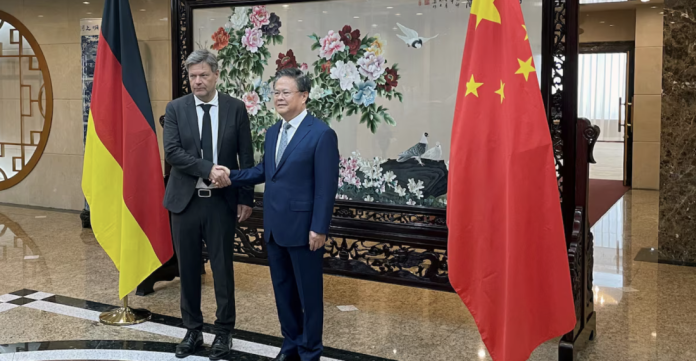In Beijing, a high-level dialogue took place between China and Germany to promote further co-operation on climate change and green transition, China media reported.
German Vice Chancellor Robert Habeck and Zheng Shanjie, chairman of the National Development and Reform Commission (NDRC), conducted the dialogue and exchanged views on energy efficiency and carbon reduction. The meeting marked the first of its kind since China and Germany agreed to set up the mechanism a year ago.
According to Habeck, global climate goals are impossible to achieve without China’s involvement and Beijing has to find a safe alternative to coal, which accounted for nearly 60 per cent of the country’s electricity supply last year. Expanding the power grid and using batteries for energy storage may decrease the number of conventionally fuelled power plants necessary to meet China’s demand, Habeck argued. He also mentioned China is extending coal production for security reasons.
China, for its part, aims to peak carbon dioxide emissions by 2030, a major turning point in the global fight against climate change. In addition, the rapid growth of renewable energy is underpinning this transformation, fuelling the development of electric vehicles, energy storage solutions and other advanced technologies, according to CGTN.
The issue of overcapacity in China’s green industry has again become a widely discussed topic as China allegedly exports subsidised electric vehicles (EVs) to the EU market. The chairman said the claims are contrary to market rules and economic common sense. He emphasised, protectionism will only delay the global response to climate change and the transition to a green and low-carbon economy, stressing that China in particular has taken all measures to protect the legitimate rights and interests of Chinese enterprises.
Habeck also reaffirmed the world is witnessing a negative trend of protectionism that has spread across the globe and some restrictions that limit production will hurt the global economy. Especially significant within the boundaries of China-Germany relations, as Beijing has been Berlin’s most important partner in trade for 8 years. Meanwhile, Germany has been China’s most important trading partner in the EU for decades, and the automotive industry has been one of the most important areas of green co-operation.
Strengthening co-operation on new energy and green transition between China and Germany could unlock more market opportunities in areas such as manufacturing and the consumer market, according to Yuan Shenglong, deputy director and associate research fellow at the Institute for International Economic Research of the NDRC.
